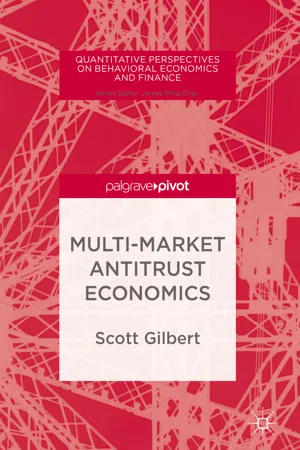1.2 Antitrust Theme: Don’t Rip Off Consumers
Getting ripped-off feels bad. For example, in grade school I saved up some money and bought a box of candies—called “Everlasting GobStoppers”—and brought it to school to set up shop and sell to my classmates after class. As I set up shop, a crowd of classmates gathered and as I named my price and tried to make my first sale, furtive hands snatched candies from the box. Before I knew it, I’d lost most of my inventory and ended up losing most of my savings. I’d planned to make a profit by charging my classmates more per candy than they’d likely pay at the “five-and-dime” store I bought candy from. Was I planning to rip them off? Or make a fair and reasonable profit? At age 11, and lacking an economics education at the time, I could not have answered those questions. I was sure then, as I am now, that my classmates ripped me off, pure and simple.
The term “rip-off” conveys violence—a violent separation of cash from wallet, purse, or bank account. Getting ripped-off is not fair, at least not to the victim, and probably not to society at large. The United States, which inherits much of its legal traditions and procedures from medieval England, has written laws—or statutes—and judges’ written decisions and opinions, or case law, that spell out what it means in the United States to rip someone off badly enough to run afoul of the law. Corresponding laws in other British ex-colonies, specifically Canada and Australia, and European Union countries, are broadly similar.
If a rip-off is an outright theft, or more subtly a fraud, then it is a crime and in the domain of criminal law. If neither theft nor fraud, a rip-off may not be a crime yet be offensive enough to warrant some legal remedy or corrective action in civil law. For example, in college I traveled with a friend to a Zen Buddhist retreat in Canada, and while driving back we filled up at a Canadian gas station that accepted our US dollars but as one-for-one with Canadian dollars, whereas US dollars were worth more than Canadian dollars in the open market. Like many rip-off victims we didn’t notice what happened until later. The transaction itself could have been a fraud, but given the somewhat hazy circumstances was more likely a matter of civil law—for Canadian courts.
US antitrust law exists to provide legal remedies and corrections to price gouging by businesses, and similar sorts of rip-offs that the public is prone to. The founders of modern legal institutions (judges and the legislature) have generally aimed at expressing legal ideas in easy-to-understand terms, the term “antitrust” is potentially confusing: “trust” sounds like a good thing, and “antitrust” a bad thing, but the aim of antitrust law is not to force a bad outcome on the public. Instead, “trust” represents a situation where businesses in a given industry make a pact to set a high price for the sale of goods to the public, possibly setting up a special committee or “trust” to do the dirty work. Private meeting rooms, shades drawn, many in the back of restaurants and bars, have hosted many such “trust” meetings. By the turn of the twentieth century, such trusts had become so common and notorious in the United States that the government wrote laws that established remedies and penalties for “trust” sorts of collusion price-fixing and other sorts of offensive anti-competitive behavior. Antitrust law aims at trust-busting, or destroying the anti-competitive pacts that would otherwise allow businesses to rob consumers blind.
US antitrust laws, or statutes, most famously consist of the Sherman Antitrust Act of 1890 and the Clayton Antitrust Act of 1914, the former criminalizing the restraint of trade or commerce via “contract, combination in the form of trust or otherwise, or conspiracy,” the latter a follow-up that expands the list of offensive anti-competitive behavior to include price discrimination—charging one customer more than another for noneconomic reasons, and tying or bundling—forcing buyers of one good to buy a related good. The Clayton Act does not call offenders of the latter sort criminals but allows people, businesses, and the government (via the Federal Trade Commission2 and other agencies)—to sue offenders in federal court. […treble damages …] Taken together, the Sherman and Cla...




